Summary
Singapore prides itself on having one of the world’s lowest corporate tax rates, which is further reduced by numerous incentives and exemptions that make up its tax policy. The country follows a single-tier tax system, which means the tax paid by a company on its income is final and post-tax dividends (profits distributed to shareholders) are not taxed further. The Inland Revenue Authority of Singapore (IRAS), a government agency, is in charge of the assessment, collection, and enforcement of taxes.
This article takes a deep dive into corporate tax Singapore, covering the current corporate tax rate in Singapore as well as rates in the past; tax exemptions, tax rebates, and tax incentives, and how businesses can avail of them; and much more.
Basics of corporate tax Singapore
If you’re doing business in Singapore, here’s what you need to know about its corporate income tax system:
What is a company?
The IRAS defines a company as:
- A business incorporated or registered under Singapore’s Companies Act 1967 or any other law in force in the country. In most cases, the terms ‘Pte Ltd’ or ‘Ltd’ are part of its name.” (Incorporation is the legal process of setting up a company. Pte Ltd stands for private limited.)
- A foreign company registered in Singapore, including a branch.
- A foreign company incorporated/registered outside Singapore.
A sole-proprietorship or partnership business does not qualify as a company in Singapore.
What constitutes taxable income?
Company income generated in Singapore or received in Singapore from outside is taxed under the country’s tax laws. As per the IRAS, taxable income includes:
- Profits from trade/business.
- Income from investment (such as interest, rentals, etc).
- Income from royalties, premiums, and any other property-related profits.
- Other gains that can be categorised as revenue.
Singapore does not tax capital gains (such as gains made on the sale of fixed assets).

What is corporate tax residency?
A company is a tax resident of Singapore if the ‘control and management’ of its business remains in the country. The IRAS defines control and management as “the making of decisions on strategic matters, such as those concerning company policy and strategy”. Tax resident companies receive a Certificate of Residence (COR) from the IRAS.
Remember, a company that is incorporated in Singapore might not necessarily be a tax resident of the country.
It is more advantageous to be a tax resident company than a non-resident:
- A tax resident receives a tax exemption on foreign income such as foreign-sourced dividends, foreign branch profits, and foreign-sourced service income.
- It can claim a foreign tax credit for taxes paid in a foreign jurisdiction on income that is also taxed in Singapore.
- It is entitled to a tax exemption or concessionary tax rate under Singapore’s Avoidance of Double Taxation Agreements (DTAs).
- A new start-up with tax residency receives tax exemptions under a special scheme.
On the flipside, when a non-resident company receives payment from a Singaporean source (company/individual) for services provided in Singapore, the IRAS holds back a percentage of that income. This is called a withholding tax. Singapore levies a 15% withholding tax on interest paid on loans and rentals and a 10% withholding tax on payment from royalties. The withholding tax rate might be lowered under the country’s numerous treaties.
A company’s tax residency can change from year to year because a business is considered a tax resident only for a particular year of assessment.
What is Year of Assessment and Basis Period?
Companies are taxed on income earned in the previous financial year. So, income earned in 2021 is taxed in 2022. This means 2022 is the year of assessment (YA). The basis period is the 12-month period preceding the YA.
However, for YA 2022, the basis period need not run from January 1, 2021, to December 31, 2021. Companies are free to pick their financial year end (FYE). If they pick March 31 as their FYE, the basis period for YA 2022 runs from April 1, 2020, to March 31, 2021. Companies are required to inform the IRAS of their FYE and any changes they might make to it.
Tax rate in Singapore
Companies are taxed at a flat rate of 17% – a record low. The company tax rate in Singapore has been consistently lowered in the past 25 years in order to attract foreign investment. The tax rate in Singapore was at its highest at 26% in 1997-2000.
Singapore company tax rates in the last 25 years
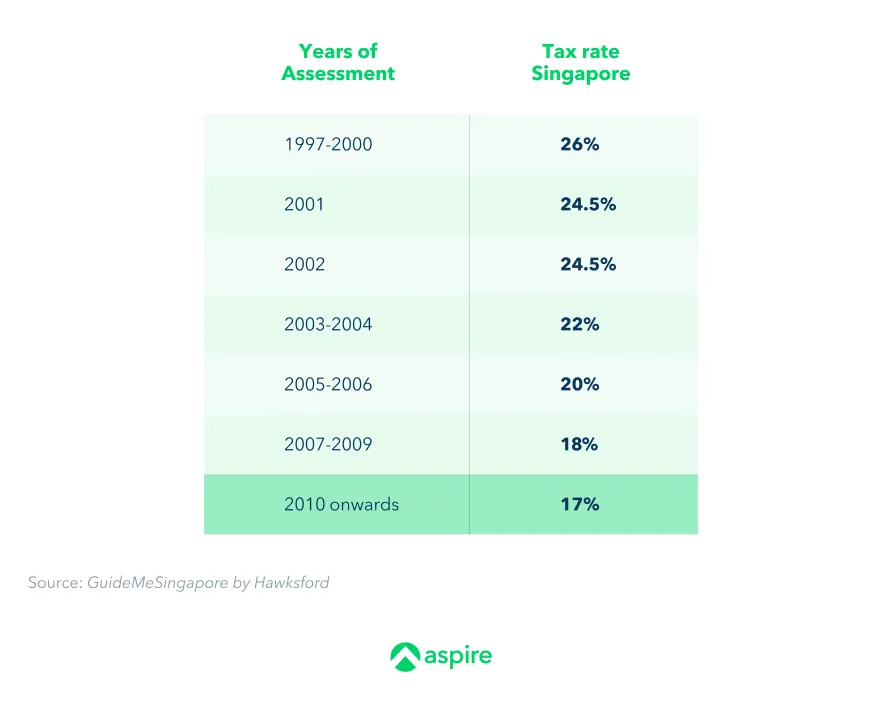
Tax exemption
As previously mentioned, tax resident businesses in Singapore enjoy IRAS tax exemption under various schemes, the main ones being:
Start-Up Tax Exemption Scheme (SUTE)
For their first three consecutive YAs, new start-ups are eligible for:
- A 75% exemption on their first SGD 100,000 of taxable income for each of the three years.
- A further 50% exemption on their next SGD 100,000 of taxable income.
- Note: These rates for tax exemption for a new company took effect in YA 2020. In YA 2019 and before, a new start-up received a 100% tax exemption on their first SGD 100,000 and a further 50% on their next SGD 200,000.
Apart from the income covered by the tax exemption for a new company, the rest of the taxable income invites the prevailing Singapore corporate tax rate of 17%.
New company tax exemption under SUTE
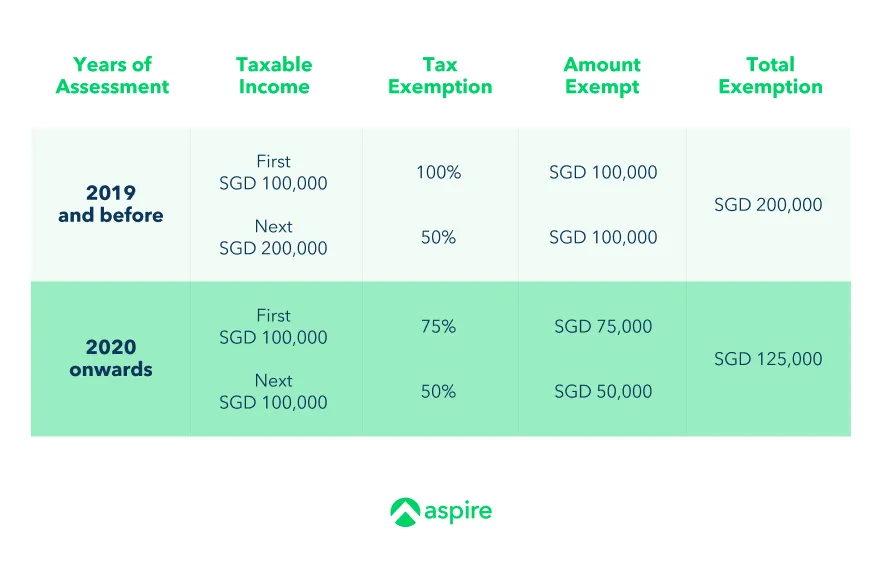
To benefit from SUTE, new start-ups must:
- Be incorporated in Singapore.
- Be a tax resident company for each YA.
- Have not more than 20 shareholders, where all of them are individuals or one of them is an individual who holds 10% of the company’s shares.
This new company tax exemption scheme does not apply to newly incorporated start-ups whose principal activity is investment-holding or developing properties for investment, sale, or both.
Partial Tax Exemption (PTE) Scheme
All companies are eligible for this scheme unless they are claiming benefits under SUTE. The PTE scheme offers:
- A 75% exemption on the first SGD 10,000 of taxable income.
- A further 50% exemption on the next SGD 190,000 of taxable income.
- The partial tax exemption scheme was revised for YA 2020, after which current rates came into force. For YA 2019 and before, the scheme offered a 75% exemption on the first SGD 10,000 and a further 50% exemption on the next SGD 290,000.
Tax exemption under PTE scheme
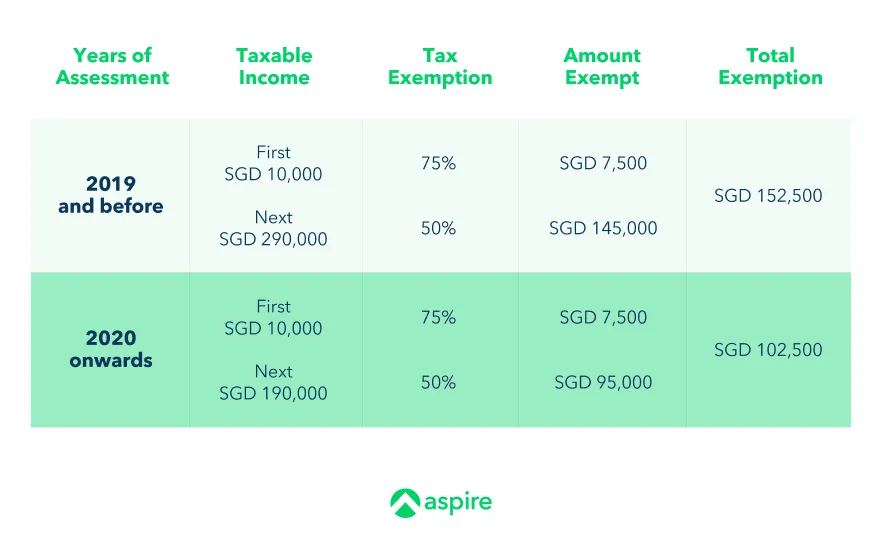
Tax incentive schemes
Apart from IRAS tax exemption schemes, Singapore offers numerous tax incentives that can lower a company’s corporate tax payment:
Development and Expansion Incentive (DEI) and Pioneer Certificate Incentive (PCI)
Under both schemes, a company is eligible for a 5% tax exemption or 10% concessionary tax rate on income derived from what constitutes ‘qualifying activities’. It can avail of the incentives for five years, following which the incentives may be extended if the company continues its expansion plans. To qualify for the incentives, a company must a) create jobs that contribute to Singapore’s workforce in terms of skills, expertise, and seniority; b) contribute to the economy through total business expenditure; c) introduce new and advanced technology, skill sets, and knowhow; and d) perform pioneering activities at a scale that benefits the national economy.
Industry-specific incentives
Companies engaged in international shipping, ship and container leasing, and support services have the Maritime Sector Incentive (MSI), which offers tax exemptions and concessionary tax rates. The Financial Sector Incentive (FSI) offers concessional tax rates of 5% and 13.5% on income earned from high-growth, high-value-added services. Similarly, Singapore has many other industry-specific tax incentive schemes.
Tax rebate
In its Budget for YA 2021, Singapore did not announce a corporate income tax rebate. But for YA 2020, companies can avail of a 25% rebate on the tax payable, capped at SGD 15,000. Apart from tax residents, registered business trusts, non-resident companies that aren’t liable for a final withholding tax, and companies that are taxed at a concessionary rate can avail of the tax rebates, which are intended to lower business costs and support restructuring activities.

Singapore tax rebate since 2013
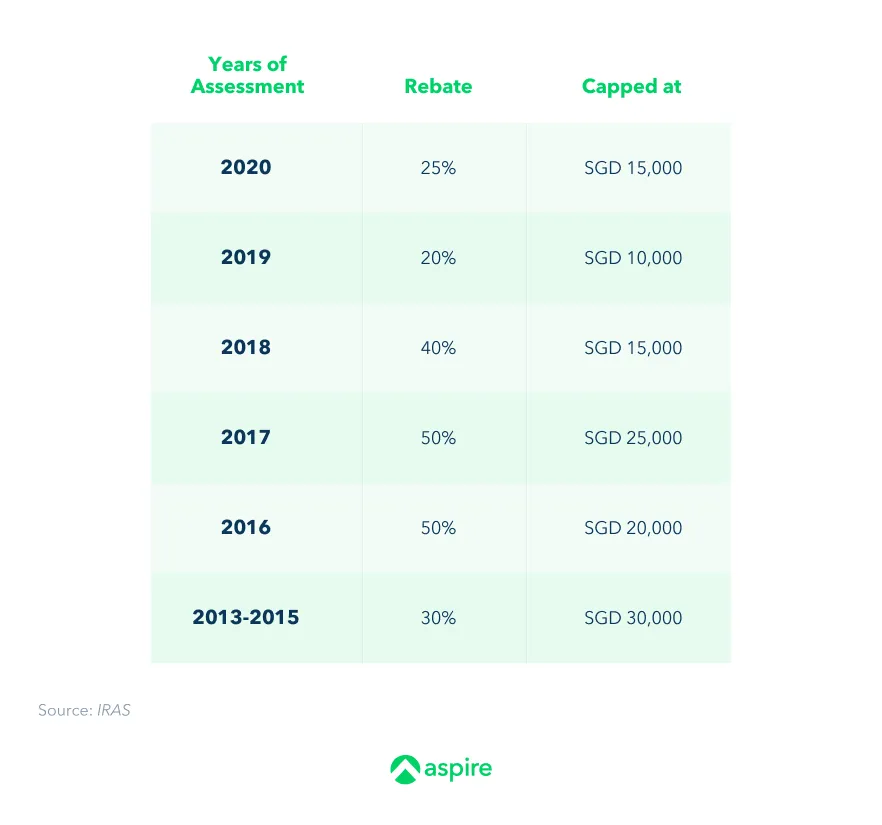
Corporate income tax rebate is charged on the tax that is payable after deducting tax set-offs, such as foreign tax credit.
Example: Computing tax rebate for YA 2020
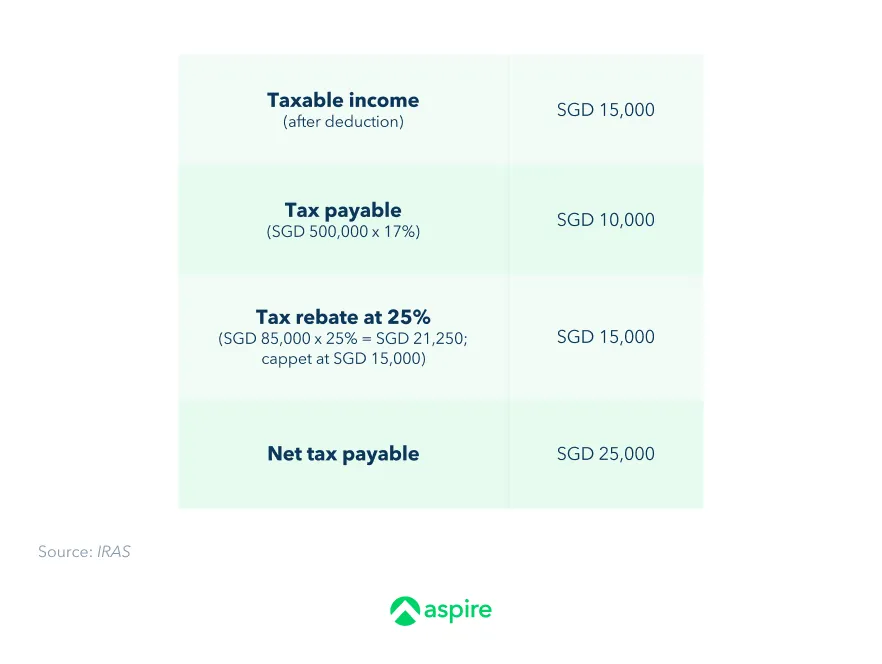
Singapore tax treaties
A tax treaty is an agreement usually between two countries that specifies how income earned by a company that does business in both countries will be taxed by each country. The primary objective of a tax treaty is to help companies avoid double taxation – when a company’s income is taxed twice, once in the country where it is generated and a second time in the country where it is received. Tax treaties provide relief to businesses through tax exemptions, tax credits, and reduced tax rates. They also spell out the taxing rights of the partner countries and act as deterrents to tax evasion through the exchange of tax information.
What is an Avoidance of Double Taxation Agreement (DTA)?
In Singapore, a bilateral tax treaty is called an Avoidance of Double Taxation Agreement (DTA). Singapore has DTAs with an extensive network of countries. To avail of the benefits available under a specific DTA, a company must be a tax resident of Singapore or of its partner country.
Income categories covered by DTAs include:
- Income from immovable property (such as real estate rentals)
- Business profits
- Dividend income
- Interest
- Royalties and fees for technical services
- Capital gains
- Directors’ fees
- Shipping and air transport profits
- Professional services income (doctors, lawyers, architects, engineers, accountants, etc)
- Income of teachers, researchers, artistes, athletes, students, trainees
- Government service remuneration and pensions
- Non-governmental pensions and annuities
Treaties covering all classes of income are called comprehensive treaties while those that only cover income from shipping/air transport are known as limited treaties.
Relief available under DTAs
The following tax concessions are available to companies in Singapore under DTAs, though conditions might vary from treaty to treaty:
1. Tax credit
There are two types of credit available:
- Ordinary credit – The company receives credit that is equal to the lower of the tax paid/payable in both countries. If the tax paid in the foreign country is higher, then the company will not receive full relief.
- Full credit – The company receives credit equal to the tax paid/payable in the foreign state, even if it is higher than the tax paid in the resident state.
Eligible companies can claim the tax credit in their annual corporate income tax returns. This must be supported with documentary proof that the income has been taxed in the foreign country (withholding tax receipts, letter from a foreign tax authority, dividend vouchers, etc).
2. Tax exemption
A Singapore tax resident company is eligible for tax exemption on foreign-sourced dividends, foreign branch profits, and foreign-sourced service income if a) the headline (highest) tax rate in the foreign state from where the income is received is at least 15%, and b) the income is subject to tax in the foreign country (even if at a rate lower than the headline rate). The exemption might apply on the entire income or part of it. To claim the tax exemption, companies must make a declaration in the relevant section of their income tax returns with the following details:
- The amount of the income and its nature (whether it is foreign-sourced dividend, foreign branch profits, or foreign-sourced service income)
- The country from which the income is received.
- The headline tax rate of that country.
- The amount of foreign tax paid/payable.
3. Tax sparing credit
A company can receive a special credit on tax it would have paid in the country where the income was generated but did not because the tax was ‘spared’ by that country under special laws to promote economic development. The resident state offers the special credit in a bid to promote investments. This type of tax credit is usually found in a DTA where one partner is a developed country and the other is a developing country.
4. Reduced tax rate
This relief is only available on the following income types – interest, dividends, royalties, and profits from international shipping and air transport.
Download the e-book on Tax Relief In Singapore for a detailed understanding of all the incentives, rebates and allowances.
Corporate income tax filing obligations
Companies in Singapore must make two tax filings to the IRAS every year:
Estimated Chargeable Income (ECI) filing
What is it? The ECI is an approximation of a company’s taxable profits (after deducting tax-allowable expenses) for a particular year of assessment.
Who files it? All companies, unless they qualify for an ECI filing waiver or are not required to file one.
How is it filed? By filing the ECI form. The IRAS sends a notification to the company a month before its financial year end. Even if the company does not receive the notification, it must file the ECI form unless it is exempt.
When is it due? The ECI filing must be made within three months of a company’s financial year end.
What supporting documents are required? The ECI form must be accompanied by a declaration of revenue, usually in the form of financial statements including a profit-and-loss account, balance sheet, cash flow statement, and statement of changes in equity. The financial statements might have to be audited if the company meets any two of the following criteria – a) its total annual revenue exceeds SGD 10 million, b) its total assets are in excess of SGD 10 million, and c) it has more than 50 employees. The ECI form must be filed online.
What happens in the case of late filing/non-filing? The company faces penalties and possible enforcement action. It also loses the option of paying in instalments.
Corporate income tax return filing
How is it filed? By filing Form C-S, Form C-S (Lite) or Form C.
Form C-S is for companies that:
- Are incorporated in Singapore
- Earn SGD 5 million or less in revenue in a year
- Have their income taxed at the prevailing tax rate of 17%
- Do not claim carry-back of current year capital allowances/ losses, group relief, investment allowance, and foreign tax credit and tax deducted at source.
Form C-S (Lite) is for companies that have an annual revenue of SGD 200,000 or less and fulfil the rest of the criteria mentioned above. Form C is for companies that do not qualify for either of the other two forms.
When is it due? Paper filings must be made by November 30 of each year while e-filings have a December 15 deadline.
What supporting documents are needed? All the above forms must be accompanied by financial statements and a tax computation for IRAS. A tax computation is a statement of tax adjustments (deduction of non-taxable income, renovation/refurbishment expenses, capital allowances on fixed assets, etc) made to a company’s profit to arrive at its taxable income. Businesses that don’t qualify as small companies must have their financial statements audited.
What happens in the case of late filing/non-filing or errors? Late filing/non-filing can lead to fines or prosecution. Errors in the tax returns can invite a fine of SGD 5,000 or up to 200% of the tax amount undercharged, and/or a jail sentence of up to three years. These penalties go up if the IRAS deduces the errors were deliberate, with an intention to evade taxes.

Tax payment due date
Companies in Singapore must pay their corporate income tax within a month of the date the notice of assessment (NA) is issued by the IRAS. Companies usually receive the notice of assessment – also called a tax bill – from April-end onwards. If a company does not agree with the IRAS tax computation, it has the option of filing an objection with the agency within two months of the date of the NA. The objection must be accompanied by Form C-S/C, financial statements, and the company’s tax computation. Even if an objection has been raised, the company must still pay its tax within the stipulated date, failing which it will face a 5% penalty and a subsequent 1% penalty for each month the tax remains unpaid. If the penalties don’t work, the IRAS might initiate legal action against the company. If the objection is upheld, the company will receive the excess tax paid by it as a refund.
Digital services for your corporate income tax needs
The IRAS offers numerous digital services for companies for their corporate tax needs on its website iras.gov.sg.
- Tax filing: Companies can file their ECI Form and Forms C-S/C-S (Lite)/C on the IRAS portal, submit their supporting documents, and even revise their forms.
- Status check: Companies can check the status of their tax filing. They can also view and print their notice of assessment for the current year and for the past three years.
- Objection filing: If a company doesn’t agree with the IRAS tax computation, it can raise an objection on the agency’s portal.
- Others services: These allow companies to apply for a Certificate of Residence, make an appeal for a waiver from filing Form C-S/C-S (Lite)/C if they are a dormant company, make tax payments, check the status of their payment and if they have any outstanding tax dues, access the company dashboard (which contains details such as the company’s corporate profile, filing and assessment status), and update its corporate profile and contact details.







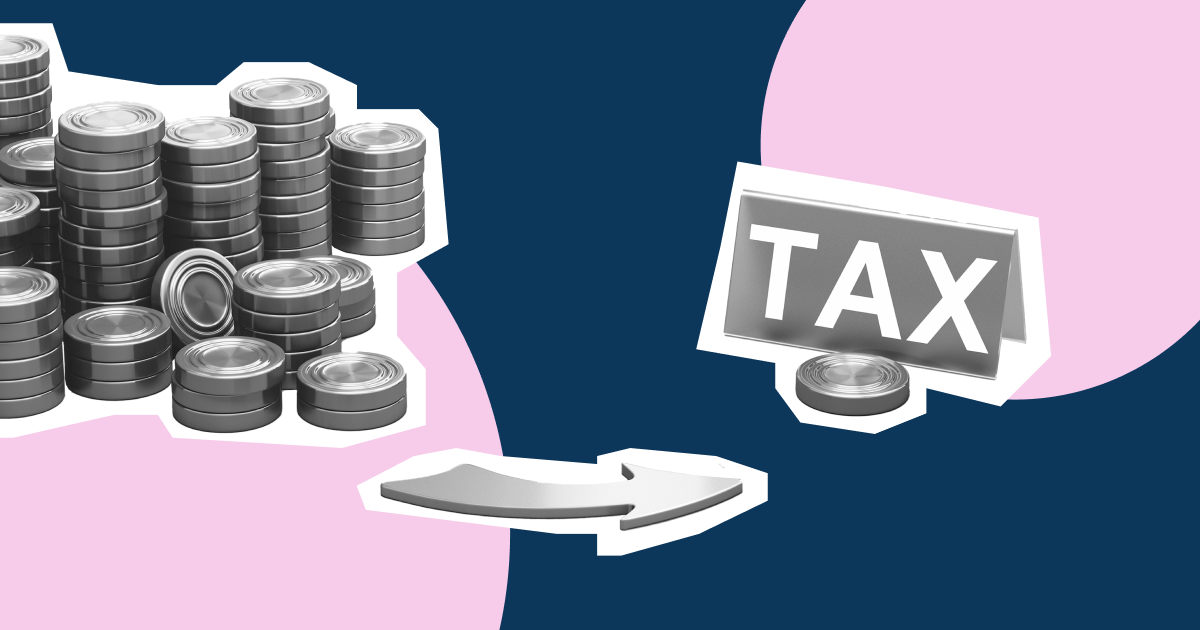

%201.webp)


.webp)